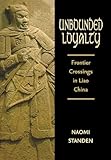Unbounded Loyalty : Frontier Crossings in Liao China / Naomi Standen.
Material type: TextPublisher: Honolulu : University of Hawaii Press, [2006]Copyright date: ©2006Description: 1 online resource (328 p.) : 11 mapsContent type:
TextPublisher: Honolulu : University of Hawaii Press, [2006]Copyright date: ©2006Description: 1 online resource (328 p.) : 11 mapsContent type: - 9780824829834
- 9780824865351
- 911/.5109021 22
- DS751.74 .S73 2007eb
- online - DeGruyter
- Issued also in print.
| Item type | Current library | Call number | URL | Status | Notes | Barcode | |
|---|---|---|---|---|---|---|---|
 eBook
eBook
|
Biblioteca "Angelicum" Pont. Univ. S.Tommaso d'Aquino Nuvola online | online - DeGruyter (Browse shelf(Opens below)) | Online access | Not for loan (Accesso limitato) | Accesso per gli utenti autorizzati / Access for authorized users | (dgr)9780824865351 |
Browsing Biblioteca "Angelicum" Pont. Univ. S.Tommaso d'Aquino shelves, Shelving location: Nuvola online Close shelf browser (Hides shelf browser)

|

|

|

|

|

|

|
||
| online - DeGruyter Turning Pages : Reading and Writing Women's Magazines in Interwar Japan / | online - DeGruyter Twilight over Burma : My Life as a Shan Princess / | online - DeGruyter Two Homelands / | online - DeGruyter Unbounded Loyalty : Frontier Crossings in Liao China / | online - DeGruyter Uncultural Behavior : An Anthropological Investigation of Suicide in the Southern Philippines / | online - DeGruyter Under an Imperial Sun : Japanese Colonial Literature of Taiwan and the South / | online - DeGruyter Under Construction : The Gendering of Modernity, Class, and Consumption in the Republic of Korea / |
Frontmatter -- Contents -- Maps, Figures, Tables -- Preface -- Introduction -- Part I: Borders, Boundaries, and Frontier Crossers: Concepts and Background -- CHAPTER 1. You Can't Get There from Here: Rethinking Categories -- CHAPTER 2. Fed or Dead: Notions and Uses of Loyalty (zhong) -- CHAPTER 3. Crossing Boundaries and Shifting Borders: The First-generation Liao Southerners -- Part II: Working for the Liao: Life Stories -- CHAPTER 4 . Loyalties in the Borderlands: The Founder and the Confucian -- CHAPTER 5. An Emerging Boundary: Two Approaches to Serving the Liao -- CHAPTER 6. Drawing the Line: Redefinitions of Loyalty -- CONCLUSION Locating Borders Then, Now, and In Between -- Appendix -- Abbreviations -- Notes -- Glossary -- Bibliography -- Index -- About the Author
restricted access online access with authorization star
http://purl.org/coar/access_right/c_16ec
Unbounded Loyalty investigates how frontiers worked before the modern nation-state was invented. The perspective is that of the people in the borderlands who shifted their allegiance from the post-Tang regimes in North China to the new Liao empire (907-1125). Naomi Standen offers new ways of thinking about borders, loyalty, and identity in premodern China. She takes as her starting point the recognition that, at the time, "China" did not exist as a coherent entity, neither politically nor geographically, neither ethnically nor ideologically. Political borders were not the fixed geographical divisions of the modern world, but a function of relationships between leaders and followers. When local leaders changed allegiance, the borderline moved with them. Cultural identity did not determine people's actions: Ethnicity did not exist. In this context, she argues, collaboration, resistance, and accommodation were not meaningful concepts, and tenth-century understandings of loyalty were broad and various.Unbounded Loyalty sheds fresh light on the Tang-Song transition by focusing on the much-neglected tenth century and by treating the Liao as the preeminent Tang successor state. It fills several important gaps in scholarship on premodern China as well as uncovering new questions regarding the early modern period. It will be regarded as critically important to all scholars of the Tang, Liao, Five Dynasties, and Song periods and will be read widely by those working on Chinese history from the Han to the Qing.
Issued also in print.
Mode of access: Internet via World Wide Web.
In English.
Description based on online resource; title from PDF title page (publisher's Web site, viewed 02. Mrz 2022)


